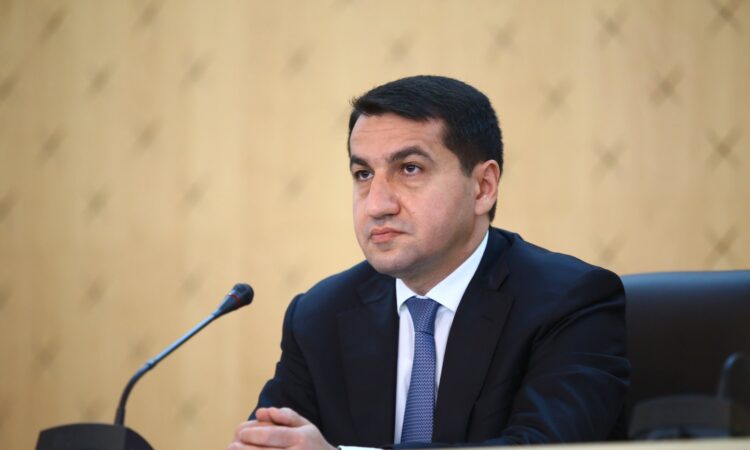
According to the released information, participants discussed the state of bilateral relations and current issues in foreign and defense policy of mutual interest. From the Azerbaijani side, the meeting was attended by Hikmet Hajiyev, Assistant to the President of Azerbaijan and Head of the Foreign Policy Department of the Presidential Administration. Representing the EU was Enrique Mora, Deputy Secretary-General for Political Affairs of the European External Action Service.
Despite the broad range of topics discussed, the question arises as to what this dialogue represents as a negotiation platform and what its primary goal is.
These questions stem from the diverse issues discussed at the meeting. For instance, the parties touched upon the normalization of relations between Azerbaijan and Armenia, which is purely political. However, the next topic – Azerbaijan’s role as an important energy partner for Europe – pertains more to the economy. This is also true for the development of the Middle Corridor, which relates to the economy, while the EU’s support for demining processes in Azerbaijan and assistance to landmine victims involves both political and social components.
Azerbaijan’s interest in potential cooperation with the EU within the framework of the European Peace Facility (EPF) – is this more about economy or politics? Considering that the fund, created in March 2021, has a budget of around €5 billion for the period up to 2027, it seems that Azerbaijan is seeking to attract these funds to address its economic issues that are also of interest to the EU.
However, this fund aims to help the EU address political issues such as conflict prevention, peacekeeping, and strengthening international stability and security, for example, by enhancing the capabilities of armed forces. So, in what context should Azerbaijan’s potential cooperation with the EU, involving funds from this facility, be considered?
Similar platforms are created by the EU with individual countries of interest as well as groups of countries. For instance, a similar platform exists with Armenia, and in January 2023, the first high-level political and security dialogue meeting between the EU and Armenia was held in Yerevan. Armenia was represented by Deputy Foreign Minister Vahé Gevorgyan, and the EU was represented by the same Enrique Mora.
Since Azerbaijan had not yet conducted its anti-terrorist operation in Karabakh, which took place in September of the same year, Vahé Gevorgyan expressed gratitude for “all the mediation efforts” necessary “to ensure the rights and security of the Armenian population in Karabakh.”
But Azerbaijan has repeatedly stated its readiness to ensure the security of the Armenian population in Karabakh.
If we consider the “Armenian” example of the security dialogue between the EU and other countries, we should also mention the high-level political and security dialogue between the EU and five Central Asian countries (Kazakhstan, Kyrgyzstan, Tajikistan, Turkmenistan, Uzbekistan), the first meeting of which took place in 2013 in Brussels.
There, completely different issues are discussed, such as combating terrorism and violent extremism, drug trafficking, and border management. The European Union has a history of cooperation in security not only with Central Asian countries themselves but also with Afghanistan, through border management programs BOMCA (in Central Asia) and BOMNAF (in Afghanistan).
So, what unites all these high-level dialogues with individual countries and sometimes with groups of countries? Undoubtedly, the geography of the countries involved in such negotiation platforms depends directly on the geopolitical and economic interests of the European Union itself. Key projects and topics mentioned earlier and discussed during Hikmet Hajiyev’s meeting with Enrique Mora, such as the Middle Corridor, are crucial. This corridor is one branch of China’s global “One Belt, One Road” initiative, aimed at ensuring transportation routes from China to different parts of the world, including Europe.
Europe is naturally interested in strengthening trade relations with Asia and China, and thus in the development of the Middle Corridor (Trans-Caspian International Transport Route). The EU has committed to invest €10 billion in its development, including new commitments from the European Commission and the European Investment Bank amounting to €1.5 billion, as well as additional funds within the European Commission’s open investment guarantee architecture. However, this mainly concerns the Central Asian part of the route, as there are no transit issues after the new port infrastructure in Azerbaijan was commissioned and railway lines were modernized.
In some Central Asian countries, these routes still need to be built. But who prevents Azerbaijan from obtaining funds for further infrastructure modernization of its part of the transit route through this same security dialogue platform with the EU?
To implement all its plans, the EU needs a reliable and controlled situation in all regions of strategic interest, including the South Caucasus, where it expects lasting peace. Hence, when Azerbaijan emphasizes the bilateral nature of its dialogue with Armenia, the EU confirms its support for the peace process to ensure stability. But we shouldn’t be deceived.
The EU primarily cares about the uninterrupted supply of Azerbaijani gas to Europe at acceptable prices, functioning transportation routes through Azerbaijan, and preventing Armenia from falling further into Russia’s sphere of influence. This is why Europe is vocal about the freeze on Georgia’s EU membership, perceiving the “foreign agents law” as increased Russian influence in Georgia, threatening the stability of the entire South Caucasus, and thus the transit of Asian goods and energy resources through Georgia.
In conclusion, security dialogue meetings between the EU and Azerbaijan, Armenia, or Central Asian states offer Europe a way to stay informed about the current situation, understand financial support needs, provide political assistance for specific projects, and influence processes. These negotiations do not obligate anyone but allow better mutual understanding.
Rauf Nasirov
Translated from minval.az






